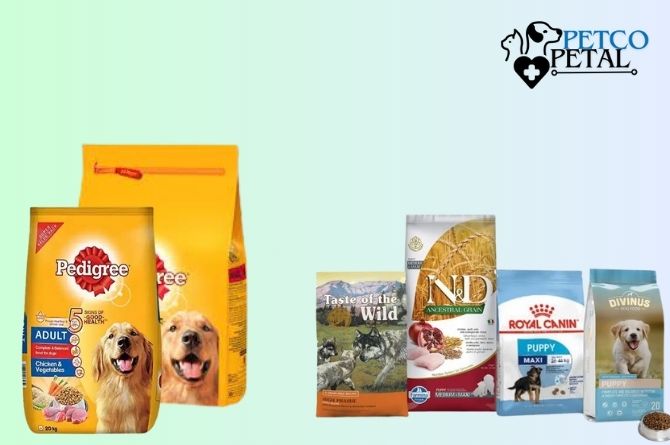Introduction
German Shepherds are known for their intelligence, strength, and loyalty, making them one of the most popular dog breeds worldwide. Their active lifestyle and large, muscular build require a diet that is specifically tailored to meet their unique nutritional needs. Feeding them the right dog food for German Shepherds is crucial to maintaining their health, energy, and overall well-being.
Choosing the appropriate food not only supports their physical development but also helps prevent common health issues like joint problems, digestive disorders, and allergies. In this guide, we’ll explore the best dietary options for German Shepherds, ensuring they receive the balanced nutrition they need to thrive.
Why Choosing the Right Dog Food for German Shepherds is Important
German Shepherds are a robust and active breed, but they are prone to certain health issues that can be managed or even prevented with the right diet. Common health problems in German Shepherds include:
Hip Dysplasia: This is a genetic condition that affects the hip joints, leading to pain and mobility issues. A diet rich in glucosamine and chondroitin can support joint health and reduce the risk of hip dysplasia.
Digestive Problems: German Shepherds are known to have sensitive stomachs, making them prone to digestive disorders such as bloating, diarrhea, and irritable bowel syndrome. Choosing dog food with easily digestible ingredients, probiotics, and fiber can help maintain a healthy digestive system.
Allergies: This breed can develop food allergies or sensitivities to certain ingredients, such as grains or chicken. Selecting hypoallergenic or limited-ingredient dog food for German Shepherds can minimize the risk of allergic reactions.
A balanced diet is essential for supporting their growth, energy levels, and coat health. German Shepherds require high-quality protein for muscle development, healthy fats for energy, and specific vitamins and minerals for their immune system and overall well-being. Selecting the appropriate dog food for German Shepherds can prevent many health problems, ensuring your pet lives a healthy and active life. By understanding their unique nutritional needs, you can make informed choices that benefit your German Shepherd’s long-term health.
Key Nutritional Requirements for German Shepherds
To keep your German Shepherd healthy and energetic, it’s essential to provide a diet that meets their specific nutritional needs. Here are the key components that should be included in any high-quality dog food for German Shepherds:
High-Quality Protein
German Shepherds are a muscular breed that requires a diet rich in high-quality protein. Protein is crucial for muscle development, tissue repair, and maintaining a healthy immune system. Look for dog food that includes real meat sources like chicken, beef, lamb, or fish as the primary ingredient. Ideally, the protein content should be at least 22-24% for adult German Shepherds and even higher for active or working dogs.
Healthy Fats
Fats are a vital energy source for German Shepherds, supporting their active lifestyle. They also play a significant role in maintaining a shiny coat and healthy skin. Opt for dog food that includes healthy fats like fish oil, chicken fat, or flaxseed, which are rich in Omega-3 and Omega-6 fatty acids. These fats can also help reduce inflammation and support joint health, which is particularly important for this breed prone to hip dysplasia.
Vitamins and Minerals
German Shepherds need a well-balanced diet rich in vitamins and minerals to support overall health, bone strength, and immune function. Essential vitamins like A, D, E, and B-complex contribute to healthy vision, skin, and coat, while minerals like calcium and phosphorus are crucial for strong bones and teeth. The right dog food for German Shepherds will ensure these nutrients are included in the appropriate amounts to prevent deficiencies and related health issues.
Probiotics and Fiber
German Shepherds are known to have sensitive digestive systems, making probiotics and fiber essential components of their diet. Probiotics promote healthy gut bacteria, aiding in digestion and reducing the risk of gastrointestinal issues like diarrhea and bloating. Fiber, on the other hand, helps regulate bowel movements and supports colon health. When choosing dog food for German Shepherds, look for added probiotics and natural fiber sources like sweet potatoes, pumpkin, and peas to maintain optimal digestive health.
Meeting these nutritional requirements will help ensure that your German Shepherd is healthy, active, and able to enjoy a high quality of life. By providing the right balance of protein, fats, vitamins, and digestive support, you can address their specific needs and promote long-term health and vitality.
Top 5 Dog Food Brands for German Shepherds
Choosing the best dog food for German Shepherds can be overwhelming with so many options available. To help you make an informed decision, here are the top 5 dog food brands that cater to the specific needs of this breed:
1. Royal Canin Breed Health Nutrition German Shepherd
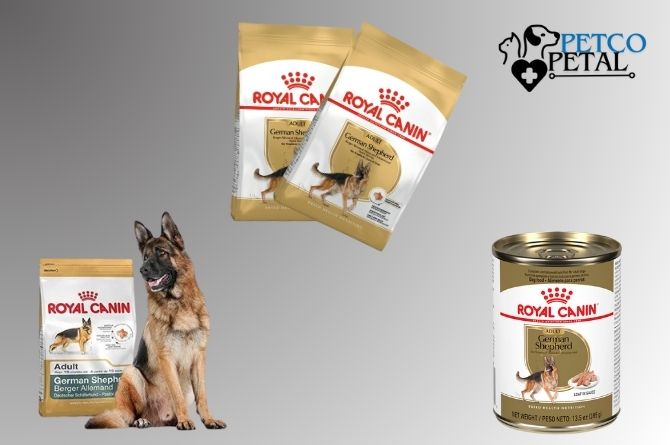
Royal Canin offers a specialized formula designed specifically for German Shepherds. This dog food is tailored to meet their unique nutritional needs, supporting healthy digestion and promoting optimal skin and coat health.
Key Benefits:
Highly Digestible Proteins: Supports digestive health and reduces the risk of digestive issues, which are common in German Shepherds.
Glucosamine and Chondroitin: Helps maintain joint and bone health, reducing the risk of hip dysplasia and arthritis.
Exclusive Kibble Shape: The unique shape of the kibble is designed to encourage chewing, improving dental health.
This formula is an excellent choice for German Shepherd owners looking for breed-specific nutrition.
2. Hill’s Science Diet Adult Large Breed

Hill’s Science Diet is known for its high-quality ingredients and scientifically formulated recipes. This large breed formula is ideal as dog food for German Shepherds, focusing on joint health and muscle maintenance.
Key Benefits:
Balanced Nutrients: Provides a perfect blend of high-quality protein, healthy fats, and essential vitamins to support overall health.
Omega-6 Fatty Acids and Vitamin E: Promotes healthy skin and a shiny coat.
Natural Glucosamine and Chondroitin: Supports joint health, which is critical for active German Shepherds.
This dog food is an excellent option for maintaining the health and vitality of adult German Shepherds.
3. Blue Buffalo Life Protection Formula
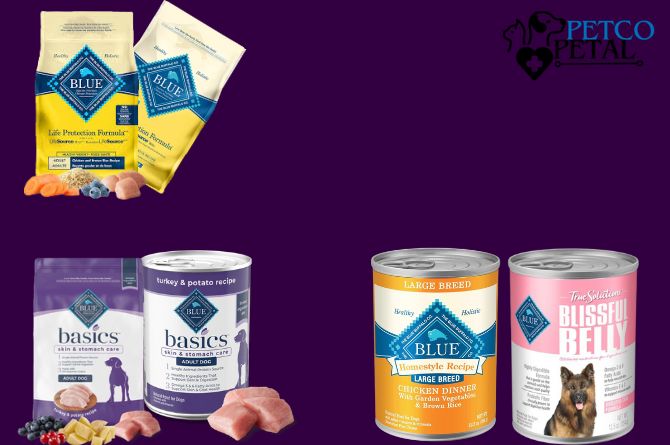
Blue Buffalo’s Life Protection Formula is a top choice for dog owners seeking natural ingredients and high-quality protein sources. It is specially crafted to support the health and well-being of large breed dogs like German Shepherds.
Key Benefits:
Real Meat First Ingredient: High-quality deboned chicken provides essential amino acids for muscle growth and maintenance.
LifeSource Bits: A precise blend of antioxidants, vitamins, and minerals to support immune system health and oxidative balance.
Glucosamine for Joint Health: Helps maintain joint function and mobility, which is essential for German Shepherds.
With no artificial preservatives or by-products, this formula is a great natural option for your dog’s diet.
4. Wellness CORE RawRev High-Protein
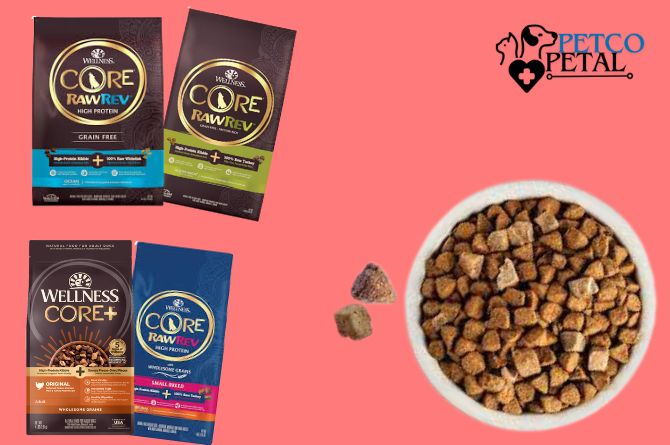
Wellness CORE RawRev combines high-protein kibble with pieces of freeze-dried raw meat, making it an excellent choice for active German Shepherds. This formula offers a unique blend of nutrients to fuel their energy levels and support overall health.
Key Benefits:
High Protein Content: Supports lean muscle mass and provides the necessary energy for active dogs.
Grain-Free Formula: Ideal for dogs with grain sensitivities, promoting easy digestion.
Omega Fatty Acids: Supports healthy skin and a shiny coat.
This dog food is perfect for German Shepherds who thrive on a high-protein diet and enjoy the taste of raw food.
5. Purina Pro Plan Large Breed Adult
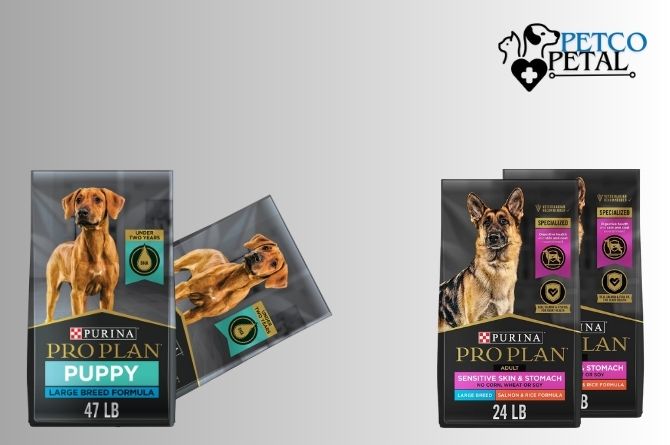
Purina Pro Plan’s large breed formula is designed to support the specific needs of large dogs like German Shepherds. It focuses on joint health and digestion, making it an excellent choice for maintaining your dog’s overall well-being.
Key Benefits:
High-Quality Protein: Real chicken as the first ingredient supports strong muscles.
Prebiotic Fiber: Promotes healthy digestion and gut health, which is crucial for German Shepherds.
Omega-3 Fatty Acids and Glucosamine: Supports healthy joints and mobility, reducing the risk of joint issues.
Purina Pro Plan is a trusted brand that offers a balanced and nutritious option for German Shepherds, ensuring they get the essential nutrients they need to stay active and healthy.
These top 5 dog food brands provide a variety of options tailored to the specific needs of German Shepherds, helping you find the best diet for your furry friend.
Homemade Dog Food for German Shepherds
Preparing homemade dog food for German Shepherds can be a rewarding experience, as it allows you to control the ingredients and ensure your dog is getting a balanced diet. However, it’s important to understand the pros and cons and know which ingredients to include and avoid.
Pros and Cons of Homemade Diets
Pros:
Control Over Ingredients: You can select high-quality, fresh ingredients and avoid artificial additives, fillers, and preservatives.
Customization: Tailor the diet to your German Shepherd’s specific health needs, allergies, or preferences.
Bonding Experience: Preparing food for your pet can enhance the bond between you and your German Shepherd.
Cons:
Time-Consuming: Preparing homemade food requires time and effort, including meal planning, cooking, and portioning.
Nutritional Imbalance: Without proper knowledge, it’s easy to miss out on essential nutrients, which can lead to deficiencies.
Cost: High-quality ingredients can be more expensive compared to commercial dog food.
Special Considerations When Choosing Dog Food for German Shepherd Puppies
Feeding German Shepherd puppies requires special attention to their nutritional needs to ensure proper growth and development. As they transition from puppyhood to adulthood, their diet must support their energy levels, bone strength, and overall health.
Nutritional Needs for Growth and Development
German Shepherd puppies grow rapidly, especially during the first year. A diet that provides balanced nutrition is essential to support their growth and prevent health issues such as joint problems or malnutrition.
High-Quality Protein: Essential for building strong muscles and supporting healthy development. Look for puppy food with high-quality animal proteins like chicken, lamb, or fish.
Calcium and Phosphorus: These minerals are crucial for bone development. However, an excess can cause skeletal problems, so ensure the food has an appropriate ratio.
DHA and Omega-3 Fatty Acids: Important for brain and eye development. Fish oil or flaxseed oil are excellent sources of these nutrients.
Calories and Fat Content: Puppies need more calories than adults to fuel their energy needs. Choose a puppy formula with higher fat content to support growth and maintain a healthy weight.
Probiotics and Fiber: Supports healthy digestion, which is vital for puppies as they transition from mother’s milk to solid food.
Transitioning from Puppy Food to Adult Dog Food for German Shepherds
The transition from puppy food to adult food is a gradual process that should be managed carefully to avoid digestive issues. Typically, German Shepherds are ready to transition at around 12 to 15 months of age.
Step-by-Step Transition:
Week 1: Mix 25% adult dog food with 75% puppy food.
Week 2: Mix 50% adult dog food with 50% puppy food.
Week 3: Mix 75% adult dog food with 25% puppy food.
Week 4: 100% adult dog food.
During this period, monitor your puppy for any signs of digestive upset, such as diarrhea or decreased appetite, and adjust the transition period accordingly.
Watch for Growth Spurts: German Shepherds can have growth spurts even after transitioning to adult food. Adjust their diet to ensure they are receiving enough nutrients without overfeeding, which can lead to obesity.
Specific Brands Recommended for German Shepherd Puppies
1. Royal Canin German Shepherd Puppy Dry Dog Food:
Key Benefits: Designed specifically for German Shepherd puppies, this formula supports their digestive health with highly digestible proteins and prebiotics. It also includes an exclusive complex of antioxidants and vitamin E to support their developing immune systems.
2. Hill’s Science Diet Puppy Large Breed:
Key Benefits: Contains controlled calcium levels for healthy bone growth and balanced minerals for strong teeth. Rich in DHA from fish oil to support brain and eye development.
3. Blue Buffalo Life Protection Formula Large Breed Puppy:
Key Benefits: Real chicken is the first ingredient, with LifeSource Bits providing a blend of vitamins, minerals, and antioxidants. It’s free from by-product meals, corn, wheat, and soy, making it a wholesome choice for German Shepherd puppies.
4. Wellness CORE Grain-Free Puppy:
Key Benefits: High-protein, grain-free formula with premium ingredients like deboned chicken, turkey meal, and salmon oil. Supports healthy growth and development with the necessary vitamins and minerals.
5. Purina Pro Plan Large Breed Puppy:
Key Benefits: Features DHA from fish oil to nourish brain and vision development, and glucosamine for cartilage and joint health. Rich in antioxidants to support a strong immune system.
Choosing the right food for your German Shepherd puppy sets the foundation for their lifelong health. Always consult with your veterinarian to tailor their diet to specific needs, and adjust portions based on growth and activity levels to ensure your puppy grows into a strong, healthy adult.
Common Mistakes to Avoid When Feeding Your German Shepherd
Feeding your German Shepherd the right diet is essential for their overall health and well-being. However, many pet owners make common mistakes that can lead to various health issues. Here are some pitfalls to avoid to ensure your furry friend thrives.
1. Overfeeding or Underfeeding
Overfeeding: Many pet owners inadvertently overfeed their German Shepherds, believing that larger dogs need more food. However, this can lead to obesity, which poses serious health risks, including joint problems and heart disease. Follow the feeding guidelines provided on dog food packaging, and adjust based on your dog’s age, weight, and activity level.
Underfeeding: Conversely, underfeeding can also be a problem, particularly in growing puppies. A lack of essential nutrients can hinder their growth and development. Regularly monitor your dog’s weight and consult with your veterinarian to determine the appropriate portion sizes for your specific German Shepherd.
2. Choosing Low-Quality Food with Fillers and Artificial Ingredients
Understanding Quality: Not all dog food is created equal. Low-quality foods often contain fillers like corn, wheat, and soy, which provide little nutritional value. Additionally, many commercial foods have artificial colors, flavors, and preservatives that can adversely affect your dog’s health.
Selecting High-Quality Options: Look for dog food that lists high-quality protein sources as the first ingredient and avoid brands that use vague terms like “meat by-products.” Always check the ingredient list to ensure your German Shepherd receives a balanced diet rich in essential nutrients.
3. Ignoring Specific Health Concerns Like Allergies or Food Sensitivities
Recognizing Allergies: German Shepherds are prone to food allergies and sensitivities, which can manifest as skin issues, digestive upset, or chronic ear infections. If you notice any unusual symptoms, consult your veterinarian for appropriate testing and dietary recommendations.
Tailoring the Diet: If your dog has known allergies or sensitivities, it’s crucial to choose a dog food formulated to meet their specific needs. For example, if your German Shepherd is allergic to chicken, opt for fish or lamb-based formulas that provide the necessary protein without triggering reactions.
4. Not Considering Life Stages
Puppy vs. Adult Food: Puppies have different nutritional needs than adults. Feeding your German Shepherd puppy food until they are fully grown is essential for their development, while adult dogs require a diet that supports their maintenance needs. Transition between puppy and adult dog food at the appropriate age, generally around 12 to 15 months.
Senior Dogs: As German Shepherds age, their metabolism and activity levels may change. Senior dogs may benefit from a diet lower in calories and higher in fiber to support healthy weight management and digestive health.
5. Lack of Variety
Boredom and Picky Eating: Feeding your German Shepherd the same food every day can lead to boredom and picky eating habits. While it’s important to maintain a consistent diet, occasionally introducing new flavors or brands can help keep mealtime exciting for your dog.
Gradual Introductions: When switching foods, do so gradually to avoid digestive upset. Mix small amounts of the new food with the old food, increasing the new food’s proportion over time.
By avoiding these common mistakes, you can help ensure that your German Shepherd receives the nutrition they need to lead a healthy and active life. Regularly consult your veterinarian for personalized dietary recommendations and monitor your dog’s weight and health to make any necessary adjustments.
Frequently Asked Questions About Dog Food for German Shepherds
1. What is the best dog food for German Shepherds with sensitive stomachs?
For German Shepherds with sensitive stomachs, it’s essential to choose dog food for German Shepherds that is easily digestible and made with high-quality ingredients. Look for formulas that are grain-free or contain alternative grains like brown rice or sweet potatoes. Brands like Hill’s Science Diet Sensitive Stomach & Skin or Royal Canin German Shepherd Adult are often recommended for their gentle formulations that minimize digestive upset.
2. How much food should I feed my German Shepherd daily?
The amount of food you should feed your German Shepherd depends on their age, weight, and activity level. Generally, adult German Shepherds require between 2 to 3 cups of high-quality dog food for German Shepherds each day, split into two meals. Puppies may need more frequent feedings, and it’s important to consult your veterinarian for specific recommendations tailored to your dog’s individual needs.
3. Can I give my German Shepherd a grain-free diet?
Yes, many German Shepherds can thrive on a grain-free diet, especially those with grain allergies or sensitivities. However, it’s essential to choose a balanced formula that includes adequate protein, healthy fats, and essential nutrients. Brands like Taste of the Wild and Merrick Grain-Free offer excellent options for dog food for German Shepherds that are free from grains while providing complete nutrition.
4. What human foods are safe for German Shepherds?
Several human foods can be safely shared with your German Shepherd in moderation. Some safe options include:
Cooked lean meats (like chicken or turkey without skin)
Fruits (such as apples, blueberries, and bananas)
Vegetables (like carrots, green beans, and sweet potatoes)
Plain yogurt (in small amounts)
Avoid foods that are toxic to dogs, such as chocolate, grapes, onions, and garlic. Always ensure any human food is given in moderation and does not replace their primary diet of dog food for German Shepherds.
These FAQs aim to clarify common concerns among dog owners, ensuring that your German Shepherd receives the best possible nutrition for a happy and healthy life. If you have any additional questions or specific dietary concerns, it’s always a good idea to consult your veterinarian.
Conclusion
Choosing the best dog food for German Shepherds is crucial to ensuring their overall health, well-being, and longevity. German Shepherds have unique dietary needs, including high-quality protein for muscle development, healthy fats for energy, and specific vitamins and minerals to support their active lifestyles. A well-balanced diet can help prevent common health issues, promote optimal growth, and maintain a shiny coat.
When selecting food for your German Shepherd, consider their age, activity level, and any specific health concerns they may have. Always prioritize high-quality ingredients and consult your veterinarian for personalized dietary recommendations tailored to your dog’s individual needs. This approach will help you provide your German Shepherd with the nutrition they require to thrive and lead a happy, healthy life. By making informed choices, you can ensure that your furry friend receives the best possible care and nutrition.

